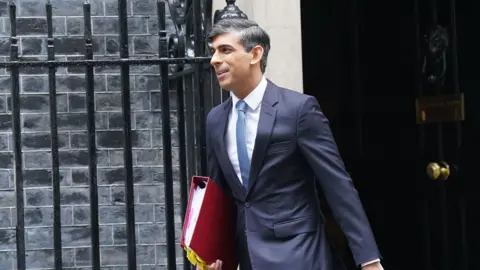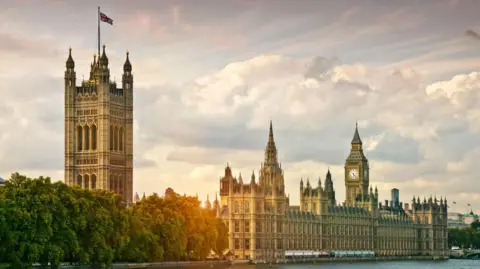David Deans,BBC Wales political reporter
 PA
PALabour’s Vaughan Gething said people across Wales are calling for a change of government as Welsh parties geared up for the general election.
Prime Minister Rishi Sunak ended speculation on Wednesday, saying voters will go to the polls on 4 July.
His party leader in the Senedd, Conservative Andrew RT Davies, said Labour’s record in the Welsh government is a “stark warning to the rest of the United Kingdom”.
Meanwhile Plaid Cymru said only it will put Wales first.
The election is the first since a major boundary review, which will cut the number of MPs in Wales from 40 to 32.
All seats will see their boundaries change, with the exception of Ynys Môn.
Welsh Labour will be hoping to expand their dominance in Wales, while the Conservatives defend the ground they won in 2019.
Led by former prime minister Boris Johnson, the party won seats in traditional Labour areas in the north east and Bridgend.
Meanwhile, Plaid Cymru will hope not to be squeezed by the two major parties – it held four seats.
At the last election Welsh Labour won 22 seats – still the largest party despite the performance of the Conservatives.
The first minister and Welsh Labour leader Vaughan Gething said on X: “People across Wales are calling out for a change of government, an end to Tory chaos and two Labour governments working together – for Wales and Britain.”
Jo Stevens, the shadow Welsh Secretary and the most senior Welsh Labour Westminster politician, said: “We have a once in a generation opportunity to deliver a Labour government at both ends of the M4, working together to deliver positive change in people’s day-to-day lives.”
In 2019 the Tories earned their largest haul since the Thatcher years, with eight seats.
The party kicked off the campaign by criticising the Welsh Labour government. Andrew RT Davies, the Senedd Conservative leader, said Mr Gething was “mired in controversy” over donations, 20mph speed limits and “out of touch plans to spend £120m on 36 more politicians”.
Hours before the announcement Conservative Welsh Secretary David TC Davies said he had not been expecting an election to be called.
Later, on BBC Wales Today, he said: “It just goes to show, don’t follow any of my betting tips.”
He added that the economy will dominate the election: “We’ve seen inflation fall today to just over 2%. We’ve seen better growth than France or Germany.”
Plaid Cymru won four seats in 2019.
The party’s leader Rhun ap Iorwerth said: “Only a vote for Plaid Cymru will put Wales’ best interests first in this election.
“The Tories have crashed the economy and hard-working people are still paying the price of high bills. Labour, on the other hand, just take Wales for granted.”
Liz Saville-Roberts, Plaid Westminster leader, said on X: “Look around and ask yourselves, is this as good as it gets?
“Plaid Cymru is ready to take the fight to the Tories and Labour to demand the fairness and ambition that Wales deserves.”
What could the election look like in Wales?
By Gareth Lewis, BBC Wales political editor
The 2019 general election changed the political map of Wales, with a Boris Johnson-inspired Conservative Party turning some unexpected parts of it blue.
The Tories took Bridgend and also swept across north Wales, taking Wrexham, Delyn, Vale of Clwyd, Clwyd South and Ynys Môn from Labour.
As Rishi Sunak announced an election will take place on 4 July, the polls indicated that we could be looking at a lot more red this time round.
In short: expect plenty of campaign visits by Labour to north Wales.
As for other colours, the green of Plaid Cymru might become a bit more prominent if they can win their target seats of Ynys Môn and Caerfyrddin.
Might there be a return of yellow, as the Liberal Democrats target one of their former strongholds in the new-look constituency of Brecon, Radnor and Cwm Tawe?
 Getty Images
Getty ImagesBattle ground seats
By Mark Palmer, BBC Wales
Vale of Glamorgan is the classic bellwether seat – if there’s a Labour UK government then a Labour MP is elected here, if it’s a Conservative MP then normally a Conservative UK government wins.
Ynys Môn is a classic three-way seat which is currently held by the Conservatives but Plaid and Labour will also be eyeing it up.
It is also the only seat in Wales which has been held by all four main parties.
Monmouthshire looks interesting where, if you look at the polls, the current Conservative MP and Welsh Secretary, David TC Davies, could be under threat from Labour.
Carmarthen will see a three-way fight between the Conservatives, Labour and Plaid Cymru which could become a four-way competition.
It could present problems for Plaid Cymru, if ex-Plaid MP Jonathan Edwards decides to stand.
Meanwhile the north east “Blue Wall” seats won by Boris Johnson’s Conservatives five years ago will be closely watched – will they revert back to Labour?
How will seats change?
The constituencies voters elect in for the 2024 general election will be different to 2019.
The number of seats will be cut from 40 in Wales to 32 – and all seats barring Ynys Môn will change in some way.
It was all agreed in a review that concluded in 2023, which sought to make seats more equal.
You can read more about the changes here.
What does Westminster do in Wales?
The existence of the Welsh Parliament means you will hear loads of promises and pledges in this election campaign about things that don’t quite relate to the election – at least, not in Wales.
It can get confusing, especially when Welsh politicians blur the lines themselves and fail to make the distinction, as has happened in the past.
The things the UK government is in charge of include criminal justice and policing, benefits, most taxation, foreign affairs and the military.
For 25 years the Senedd and the Welsh government – and the old National Assembly for Wales – have controlled health, education, agriculture and councils, among other things.
However, most of the money for these things comes from the UK government – highly relevant as Welsh public services come under pressure.
Meanwhile, Welsh leaders like Vaughan Gething, Rhun ap Iorwerth and Andrew RT Davies are not themselves seeking election to Westminster – being instead Members of the Senedd.

